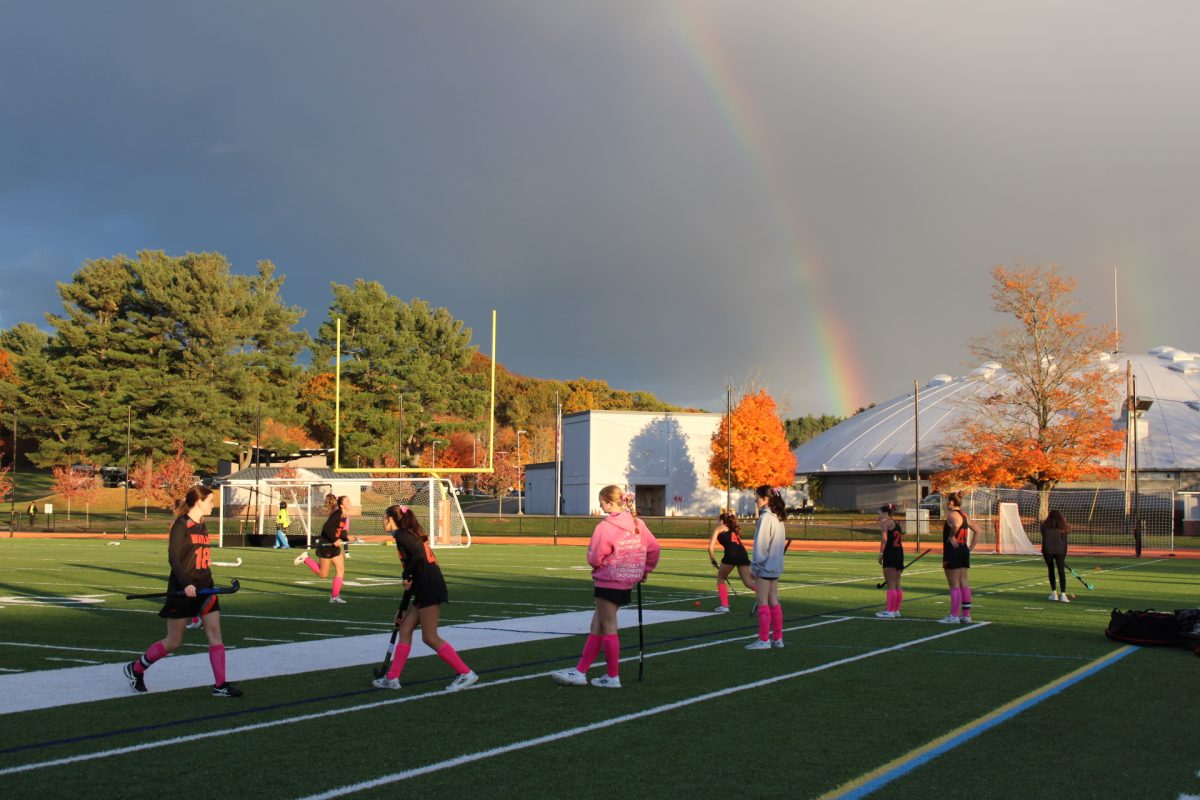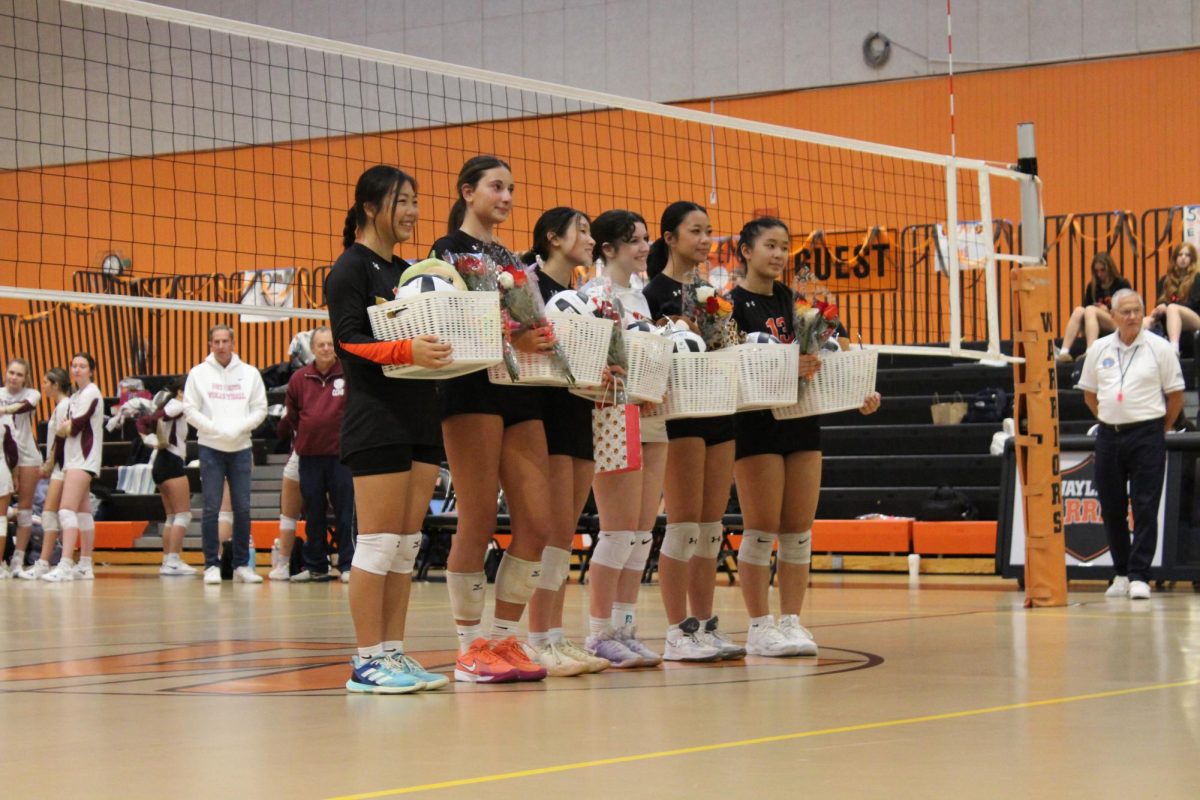Seniors begin their annual slump
Credit: Kally Proctor
As students enter the third quarter of the school year, many of Wayland High School’s seniors start experiencing “senior slump.” “I’ve noticed [a decrease] in my motivation to do any tasks,” senior Angela Liu said. “I’ve noticed I’ve become a lot less organized, I’ve been keeping track of my tasks or my papers a lot less than I would have normally.”
March 11, 2022
With the end of the first semester disappearing in the dust, the second half of the school year brings with it many changes. As students of all grades adjust to lunch time shifts, transitions to or from a fine arts class and other changes, seniors have another adjustment that has become evident.
Senior slump, also referred to as “senioritis,” is known among students and teachers as a point in the school year when many seniors experience a reduction of academic focus or a worsening of academic performance. This change tends to occur especially after acceptance into colleges, after which many seniors feel less pressured to work as hard as they previously had.
“I’ve noticed [a decrease], maybe not in performance, but in my motivation to do any tasks,” senior Angela Liu said. “I’ve noticed I’ve become a lot less organized, [and] I’ve been keeping track of my tasks or my papers a lot less than I would have normally.”
Liu is not alone in her experience. In an anonymous poll of seniors at Wayland High School, 43 out of 54 respondents said that they felt that their motivation had gone down after getting accepted into a college. This means nearly 80% of respondents have experienced similar circumstances as Liu.
“My motivation has definitely gone down since getting into college,” senior Ashley Zhu said. “I’m studying less for tests and quizzes. It’s not a really drastic change because I’ve been so used to keeping up good grades that it’s not really easy to ignore work.”
While some seniors have attributed this to a natural degradation of motivation after getting accepted into a college, others argue that the so-called “senior slump” is less of a loss of drive for seniors, but more a relieving of pressure after the arduous college application process.
“I think compared to [before senior year], I’m really just back to normal,” senior Asher Biddle said. “When you’re applying to colleges, you’re so hyper-motivated because you’re under so much pressure compared to how [you] normally feel.”
Following the end of the college application process, as many seniors begin to receive their admission letters, the pressure eases off a bit, and the seniors feel less like they have to be perfect all the time. In fact, some seniors have described senior slump as feeling “relaxing” after the stress of college applications during early senior year.
“It’s really just that I feel a lot less stressed,” Biddle said. “I’m still motivated to get my work done because I’m taking a lot of classes that I like, but I think that my motivation is really just back to normal, and I think my performance is pretty normal too.”
No matter the cause of the slump, the general consensus amongst seniors seems to be that there is indeed a lack of motivation or a decrease in performance level following the halfway mark of senior year. However, while a fall in grades is usually considered to be a bad thing, many seniors have reported that they find themselves feeling less worried after senior slump.
“Personally, I’d say I’ve gotten a lot less stressed about turning in all my assignments or getting a perfect score on a test,” Liu said. “I’ve been more accepting of just knowing that sometimes things just don’t end up perfectly. It’s kind of weird because you’d think that normally you’d never do that as a senior, but then you get to senior year and it’s like a little bit of time to just relax before going to college.”
Regardless of one’s opinion on senior slump, seniors themselves have developed a few tips that they found helpful for combatting it.
“I’d say try to sign up for classes that you know you’ll enjoy senior year,” Liu said. “I know instead of choosing one of the harder [classes], I chose forensics, which gave me more motivation to actually complete the tasks.”
In addition to picking easier classes, seniors urge students to pick classes that actually appeal to you, and which you actually care about.
“My tip would be to take classes that you like and that are interesting to you,” Biddle said. “That’s what really keeps me motivated. Because I’m taking classes that I like, I want to do the work because I think it’s interesting.”
Better study habits can also help to prevent senior slump, whether it be a particular study method that works for you, or another helpful technique.
“I think studying and doing homework with a group really helps,” Zhu said. “Even if I can’t work with people in person, I call my friends on discord or do video calls.”
As seniors continue with quarter three, many of them are winding down to enjoy their last couple months of high school. While some seniors have already adopted an “end-of-school-year” mindset and embraced the slump, others cling onto their high school days and work to maintain their performance and drive in school. Some advice?
“Don’t worry about it too much,” Liu said. “I think it’s a pretty common thing, [and] most people will probably experience it. Just don’t worry about it too much in general.”
WHS Senior Slump Infographic by Kally Proctor


























![As students enter the third quarter of the school year, many of Wayland High School's seniors start experiencing "senior slump." "I’ve noticed [a decrease] in my motivation to do any tasks," senior Angela Liu said. "I’ve noticed I’ve become a lot less organized, I’ve been keeping track of my tasks or my papers a lot less than I would have normally."](https://waylandstudentpress.com/wp-content/uploads/2022/03/Screen-Shot-2022-03-09-at-9.19.31-AM-900x594.png)

Jane C. • Mar 11, 2022 at 1:50 PM
Good luck to all the seniors! Lovely article.